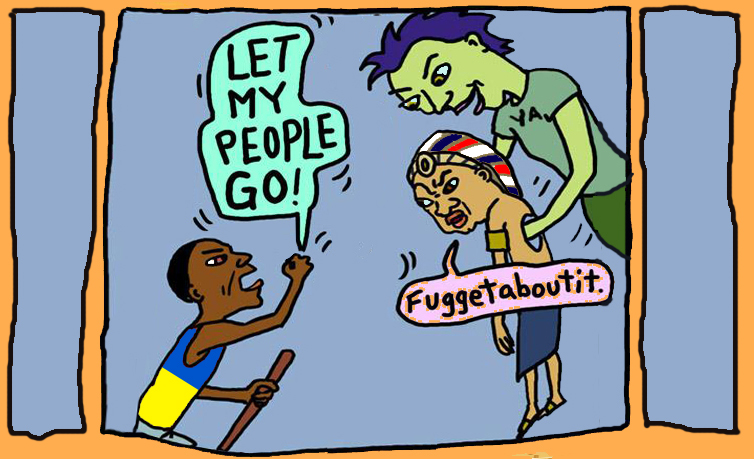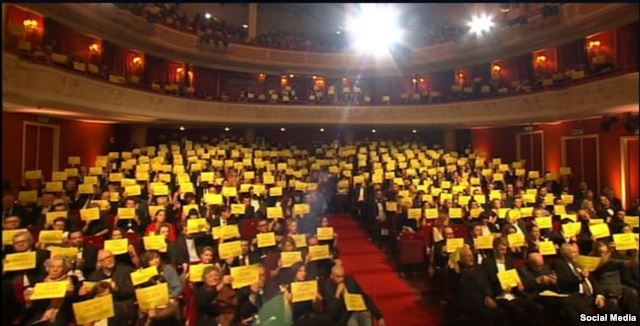Russia's seven-year hybrid war against Ukraine has resulted in not only the seizure of Crimea and eastern Ukraine but the lawless imprisonment of Ukrainian citizens based on fabricated charges. Called the "Ukrainian political prisoners of the Kremlin," currently there are over 100 such victims held in Russia or occupied Crimea. As well, at least 150 Ukrainian hostages are held by the Russian puppet "Donetsk and Luhansk People's Republics" in eastern Ukraine.
The handful of prisoners who have made it back to freedom have now launched a platform dedicated to freeing the political prisoners still behind bars. Its presentation took place on 4 March 2021 in the Theological Academy of the Orthodox Church of Ukraine in Kyiv. An initiative to facilitate the liberation of such political prisoners has been long awaited, and it is highly symbolic that it were liberated hostages who set it up.
The founders of the initiative stress that it will "fight for the release of all Ukrainian citizens behind bars - political prisoners, hostages, and prisoners of war."
"The platform is a non-partisan association created to protect the rights and release all those imprisoned for political persecution in the occupied territories and within the country. Our goal is to restore justice for everyone, release political prisoners and counter Russian aggression," told Pavlo Hryb, a co-founder of the Platform and ex-political prisoner.
Hryb, along with ten other political prisoners and 24 Ukrainian sailors, were exchanged in September 2019 as part of a deal with Russia. While creating euphoric moments, the exchange was also criticized for enabling perpetrators of crimes against Euromaidan protesters to evade punishment.
Since then, the relations of Ukrainian President Zelenskyy with Russian President Putin soured; only one small swap of prisoners in occupied Donbas was held
in 2020.
The platform was founded by:
- Stanislav Aseyev, a journalist imprisoned by the self-proclaimed authorities of the "Donetsk People's Republic" for over two years;
- Volodymyr Balukh, a Crimean farmer jailed for raising the Ukrainian flag above his house;
- Edem Bekirov, a disabled Crimean Tatar activist the Russian occupation authorities of Crimea accused of plotting an attack he physically could not have carried out;
- Akhtem Chiygoz, a leader of the Crimean Tatar Mejlis formerly persecuted by the Russian occupation authorities of Crimea;
- Pavlo Hryb, a Ukrainian teenager the Russian FSB kidnapped after luring out to Belarus and accused of terrorism;
- Mykola Karpiuk, a Ukrainian hostage Russia tortured into "confessing" of Chechnya crimes;
- Oleksandr Kolchenko, a Crimean left-wing activist Russia accused of plotting terror attacks as part of a hardliner Ukrainian nationalist group;
- Ihor Kozlovskyi, a religious scholar held in the basement prisons of the "Donetsk People's Republic" for nearly two years;
- Ihor Movenko, a Crimean imprisoned for his pro-Ukrainian views;
- Yevhen Panov, a Ukrainian activist the Russian occupation forces framed as a "saboteur";
- Ismail Ramazanov, a Crimean Tatar jailed on fake extremism charges;
- Mykola Semena, a Crimean journalist prosecuted for disagreeing with Russia's landgrab;
- Oleg Sentsov, a Ukrainian filmmaker who was sentenced to 20 years for protesting the occupation of his native Crimea, and who held a 145-day hunger strike in prison demanding to release all the Kremlin's Ukrainian hostages;
- Roman Sushchenko, a Ukrainian journalist accused of “spying” on fictitious charges;
- Oleksandr Shumkov, a Ukrainian serviceman most likely kidnapped across the Russian border and convicted of membership in the Ukrainian Right Sector organization;
- Volodymyr Zhemchugov, a Donbas-born Ukrainian partisan who lost his arms in the clash against Russian-backed militants;
- the clergy of the Orthodox Church of Ukraine and the Mufti of the Autonomous Republic of Crimea.

Deputy Speaker of the Crimean Tatar Mejlis Akhtem Chiygoz stressed that Russia will continue to illegally detain new citizens of Ukraine as long as it continues its aggression and continues to occupy Ukrainian territories. Indeed, Russia continues to regularly raid homes of Crimean Tatars and accuse them of terrorism on spurious charges.
Indeed, according to Olha Skrypnyk, the head of the Crimean Human Rights Protection Group, over the last year, the list of Ukraine's Kremlin hostages grew by 24. At the end of 2020, 69 Crimean Muslims, most of whom are representatives of the indigenous minority population of Crimean Tatars, were imprisoned under the accusation of membership in Hizb ut-Tahrir. At the start of 2021, this number grew: on 17 February, six more Crimean Tatars were detained
. Additionally, in 2020, Russia started persecuting Jehovah's witnesses in Crimea: six were imprisoned.
Russia comes for Crimean Tatars in occupied Crimea once again
The initiators of the association stress that the Platform will operate exclusively on the basis of international law, Ukrainian national law, the UN Charter, international conventions and decisions of international courts, and resolutions of other international legal organizations.
Filmmaker Oleg Sentsov shared that the Platform will hold information campaigns about the Ukrainian prisoners both in Ukraine and abroad to create pressure on the Russian leadership.
"At the international level, meetings with Russian President Vladimir Putin should begin with questions about the release of Ukrainian political prisoners," he said.
Former hostage Ihor Kozlovskyi said that each of the Platform's participants is reaching out to international partners. The Platform is open to cooperation.

Over the seven years of Russian aggression, Ukraine suffered from a lack of strategy to free its hostages. The creation of this platform appears to be a step in the right direction.
Why is the Kremlin taking Ukrainian political hostages? | VIDEO





